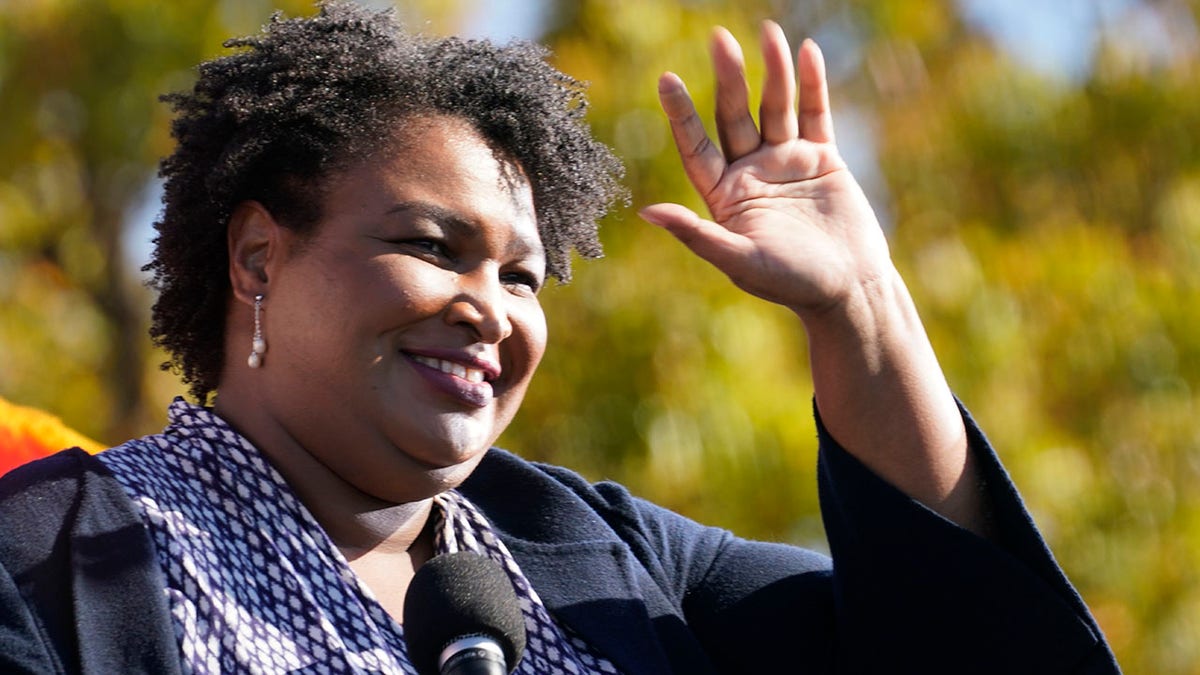Fox News Flash top headlines for August 18
Fox News Flash top headlines are here. Check out what's clicking on Foxnews.com.
A board member on Stacey Abrahms' Georgia political organization Fair Fight said in 2007 that voter fraud is most likely to occur in mail ballots, a statement that appears at odds with the group's current position against laws that impose security rules on the practice.
The board member, state Rep. Al Williams, made the comment in a 2007 NPR interview about a voting law Georgia implemented at the time. He said voter fraud was not a problem at in-person polls so the law's ID requirement was unnecessary and discriminatory. To support his position, Williams said mail voting is less secure than in-person voting.
"We have not one instance in 12 years – and that was a study done by the previous Secretary of State Cathy Cox – not one instance of voter fraud at the polls," Williams said.

Former Candidate for U.S. Senate Rep. Jack Kingston, R-Ga., right, speaks with Georgia State Representative Al Williams at the Law Enforcement Cookout at Wayne Dasher's pond house in Glennville, Ga., on Thursday, April 17, 2014. (Photo By Bill Clark/CQ Roll Call)
TEXAS DEM WHO FLED STATE WENT TO PORTUGAL TO GET MARRIED
"Most of the fraud that occurs with voting is with absentee ballots, where only a signature is required," Williams also said. "But none of these provisions will even addressed [in the 2007 law]."
But now Williams is a board member of Fair Fight, which is highly in favor of mail voting. It's supporting a Department of Justice lawsuit against a 2021 election law Georgia implemented that requires, among other things, voter ID for absentee ballots.
"We oppose all attempts to eliminate no-excuse absentee voting and we oppose any measures to add voter ID laws for mail-in ballots," Fair Fight also tweeted in January as Georgia's legislature was preparing to consider the bill that eventually became the new law. "Vote by mail works. Republicans are offering solutions in search of a problem."
Most recently, Fair Fight is promoting an effort called "#HotCallSummer," which asks activists to call their U.S. senators asking them to vote for federal legislation to override state election laws.
"In 2020, over 65 million Americans voted by mail!" Fair Fight tweeted last month. "But now, Republicans across the country are putting up barriers to voting by mail… Call TODAY and demand they take action to pass federal legislation that will protect our freedom to vote—including by mail."
TEXAS HOUSE SERGEANT-AT-ARMS VISITING HOMES LOOKING FOR DEMOCRATS WHO FLED: REPORT
Among the bills Congress is currently considering is S.1, a massive bill that would ban states from requiring photo ID to vote; raise barriers for states to clear voter rolls; require states to offer drop boxes for 45 days before an election and much more. That bill stalled in the Senate in the face of a GOP filibuster. Democrat senators are currently trying to come up with possible compromise legislation.
And next week the House will take up H.R. 4, which is also known as the John R. Lewis Voting Rights Advancement Act.
"With the John R. Lewis Voting Rights Advancement Act, proudly introduced today by Congresswoman Terri Sewell alongside Judiciary Committee Chairman Jerry Nadler, Democrats are fighting back against an anti-democratic tide, protecting access to the ballot box for every American and carrying on the cause to which our beloved John Lewis devoted his entire life," House Speaker Nancy Pelosi, D-Calif., said of the bill Tuesday.
Democrats say these bills are necessary to counter GOP-backed state election laws. Republicans, meanwhile, say Democrats' federal voting bills amount to a poorly thought-out power grab.
"This is clearly an effort by one party to rewrite the rules of our political system, but even more immediately it would create an implementation nightmare ... that would drown state and local officials," Senate Minority Leader Mitch McConnell, R-Ky., said of S.1 at a hearing earlier this year.

In this Monday, Nov. 2, 2020, file photo, Stacey Abrams speaks to Biden supporters as they wait for former President Barack Obama to arrive and speak at a campaign rally for Biden at Turner Field in Atlanta. Abrams' group Fair Fight is in against ID for absentee voting. (AP Photo/Brynn Anderson, File)
Voter fraud in the United States is extraordinarily rare, including in mail voting. While massively expanded mail voting in the 2020 presidential election created delays in the counting of ballots in some states, there is no evidence of widespread fraud in any state, despite false claims to the contrary by former President Donald Trump and others.
Nevertheless, mail ballots have been shown susceptible to fraud on a smaller scale.
A municipal election in Paterson, New Jersey in 2020 was thrown out entirely after the race's apparent winner and a sitting councilman were charged for voter fraud with mail ballots. And as states and localities sent out unsolicited mail ballots during the 2020 election, many people received ballots that were addressed to previous residents of their homes, revealing a potential security flaw with that method of voting.
CLICK HERE TO GET THE FOX NEWS APP
It's long been the consensus that while voter fraud is rare through any means, mail ballots are the most vulnerable form of voting.
"Absentee ballots remain the largest source of potential voter fraud," a report by the 2005 Carter-Baker Commission, a bipartisan panel attached to American University, said. It was chaired by former President Jimmy Carter and former Secretary of State James Baker.
Republicans, who generally oppose expanded mail voting, say that practices like ballot harvesting and universal vote-by-mail can be especially problematic.
But Americans have been increasing their use of mail ballots in recent years despite these issues. Nearly 25% of Americans voted by mail in 2016, according to the Brookings Institution – and nearly 50% in 2020 according to the MIT Election Data + Science Lab – all without widespread fraud.


